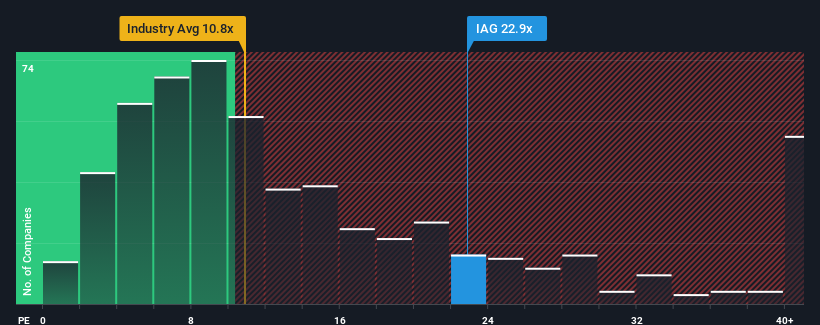Insurance Australia Group Limited's (ASX:IAG) Business Is Trailing The Market But Its Shares Aren't

When close to half the companies in Australia have price-to-earnings ratios (or "P/E's") below 19x, you may consider Insurance Australia Group Limited (ASX:IAG) as a stock to potentially avoid with its 22.9x P/E ratio. Although, it's not wise to just take the P/E at face value as there may be an explanation why it's as high as it is.
With earnings growth that's superior to most other companies of late, Insurance Australia Group has been doing relatively well. It seems that many are expecting the strong earnings performance to persist, which has raised the P/E. You'd really hope so, otherwise you're paying a pretty hefty price for no particular reason.
View our latest analysis for Insurance Australia Group

Is There Enough Growth For Insurance Australia Group?
In order to justify its P/E ratio, Insurance Australia Group would need to produce impressive growth in excess of the market.
Retrospectively, the last year delivered a decent 14% gain to the company's bottom line. Still, EPS has barely risen at all in aggregate from three years ago, which is not ideal. Accordingly, shareholders probably wouldn't have been overly satisfied with the unstable medium-term growth rates.
Turning to the outlook, the next three years should generate growth of 15% per year as estimated by the eleven analysts watching the company. Meanwhile, the rest of the market is forecast to expand by 18% per year, which is noticeably more attractive.
With this information, we find it concerning that Insurance Australia Group is trading at a P/E higher than the market. It seems most investors are hoping for a turnaround in the company's business prospects, but the analyst cohort is not so confident this will happen. There's a good chance these shareholders are setting themselves up for future disappointment if the P/E falls to levels more in line with the growth outlook.
The Bottom Line On Insurance Australia Group's P/E
It's argued the price-to-earnings ratio is an inferior measure of value within certain industries, but it can be a powerful business sentiment indicator.
We've established that Insurance Australia Group currently trades on a much higher than expected P/E since its forecast growth is lower than the wider market. Right now we are increasingly uncomfortable with the high P/E as the predicted future earnings aren't likely to support such positive sentiment for long. This places shareholders' investments at significant risk and potential investors in danger of paying an excessive premium.
Don't forget that there may be other risks. For instance, we've identified 1 warning sign for Insurance Australia Group that you should be aware of.
If you're unsure about the strength of Insurance Australia Group's business, why not explore our interactive list of stocks with solid business fundamentals for some other companies you may have missed.
New: AI Stock Screener & Alerts
Our new AI Stock Screener scans the market every day to uncover opportunities.
• Dividend Powerhouses (3%+ Yield)
• Undervalued Small Caps with Insider Buying
• High growth Tech and AI Companies
Or build your own from over 50 metrics.
Have feedback on this article? Concerned about the content? Get in touch with us directly. Alternatively, email editorial-team (at) simplywallst.com.
This article by Simply Wall St is general in nature. We provide commentary based on historical data and analyst forecasts only using an unbiased methodology and our articles are not intended to be financial advice. It does not constitute a recommendation to buy or sell any stock, and does not take account of your objectives, or your financial situation. We aim to bring you long-term focused analysis driven by fundamental data. Note that our analysis may not factor in the latest price-sensitive company announcements or qualitative material. Simply Wall St has no position in any stocks mentioned.
Have feedback on this article? Concerned about the content? Get in touch with us directly. Alternatively, email editorial-team@simplywallst.com
About ASX:IAG
Insurance Australia Group
Insurance Australia Group Limited underwrites general insurance products and provides investment management services in Australia and New Zealand.
Solid track record with excellent balance sheet.
Similar Companies
Market Insights
Community Narratives



